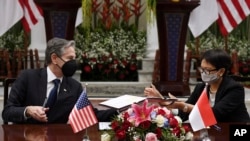On his recent trip to Indonesia - southeast Asia’s largest democracy - Secretary of State Antony Blinken outlined five elements needed to promote freedom, economic opportunity and safety for the people of the Indo-Pacific.
Number one, said Secretary Blinken, is the need to advance freedom and openness in the region:
“We mean that on an individual level, that people will be free in their daily lives and live in open societies. We mean that on a state level, that individual countries will be able to choose their own path and their own partners. And we mean that on a regional level, that in this part of the world problems will be dealt with openly, rules will be reached transparently and applied fairly, goods and ideas and people will flow freely across land, cyberspace, and the open seas.”
“Second, we seek to forge stronger connections within and beyond the region,” said Secretary Blinken:
“We’ll deepen our treaty alliances with Japan, the Republic of Korea, Australia, the Philippines, and Thailand. Those bonds have long provided the foundation for peace, security, and prosperity in the region.”
“Third, we will promote broad-based prosperity,” said Secretary Blinken. The United States has already provided more than $1 trillion in foreign direct investment in the Indo-Pacific. Moreover, the U.S. is developing an Indo-Pacific economic framework to pursue trade and the digital economy, among other areas of shared interest.
Fourth, the U.S. will address the dual threats of COVID-19 and the climate crisis. The United States has sent more than 100 million vaccine doses to the Indo-Pacific.
And regarding the climate crisis, 15 Indo-Pacific countries, including Indonesia, recently signed the Global Methane Pledge to cut emissions by 30 percent over the next decade. In the last five years, the United States has mobilized more than $7 billion in renewable energy investments in the region.
Finally, in recognition of evolving threats, the U.S. will bolster Indo-Pacific security, said Secretary Blinken:
“We’ll seek closer civilian security cooperation to tackle challenges ranging from violate extremism, to illegal fishing, to human trafficking. And we’ll adopt a strategy that more closely weaves together all our instruments of national power – diplomacy, military, intelligence – with those of our allies and our partners.”
The United States will continue to be a steadfast partner in making the Indo-Pacific more open and freer.






